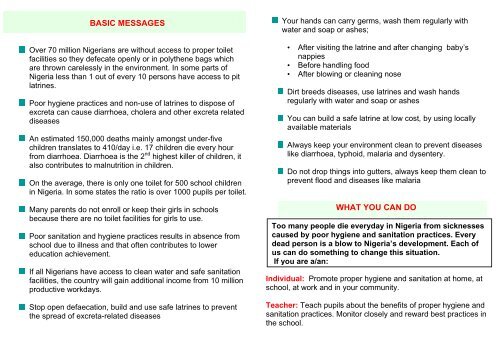WHAT YOU CAN DO BASIC MESSAGES - Development
WHAT YOU CAN DO BASIC MESSAGES - Development
WHAT YOU CAN DO BASIC MESSAGES - Development
You also want an ePaper? Increase the reach of your titles
YUMPU automatically turns print PDFs into web optimized ePapers that Google loves.
<strong>BASIC</strong> <strong>MESSAGES</strong><br />
Over 70 million Nigerians are without access to proper toilet<br />
facilities so they defecate openly or in polythene bags which<br />
are thrown carelessly in the environment. In some parts of<br />
Nigeria less than 1 out of every 10 persons have access to pit<br />
latrines.<br />
Poor hygiene practices and non-use of latrines to dispose of<br />
excreta can cause diarrhoea, cholera and other excreta related<br />
diseases<br />
An estimated 150,000 deaths mainly amongst under-five<br />
children translates to 410/day i.e. 17 children die every hour<br />
from diarrhoea. Diarrhoea is the 2 nd highest killer of children, it<br />
also contributes to malnutrition in children.<br />
On the average, there is only one toilet for 500 school children<br />
in Nigeria. In some states the ratio is over 1000 pupils per toilet.<br />
Many parents do not enroll or keep their girls in schools<br />
because there are no toilet facilities for girls to use.<br />
Poor sanitation and hygiene practices results in absence from<br />
school due to illness and that often contributes to lower<br />
education achievement.<br />
If all Nigerians have access to clean water and safe sanitation<br />
facilities, the country will gain additional income from 10 million<br />
productive workdays.<br />
Stop open defaecation, build and use safe latrines to prevent<br />
the spread of excreta-related diseases<br />
Your hands can carry germs, wash them regularly with<br />
water and soap or ashes;<br />
• After visiting the latrine and after changing baby’s<br />
nappies<br />
• Before handling food<br />
• After blowing or cleaning nose<br />
Dirt breeds diseases, use latrines and wash hands<br />
regularly with water and soap or ashes<br />
You can build a safe latrine at low cost, by using locally<br />
available materials<br />
Always keep your environment clean to prevent diseases<br />
like diarrhoea, typhoid, malaria and dysentery.<br />
Do not drop things into gutters, always keep them clean to<br />
prevent flood and diseases like malaria<br />
<strong>WHAT</strong> <strong>YOU</strong> <strong>CAN</strong> <strong>DO</strong><br />
Too many people die everyday in Nigeria from sicknesses<br />
caused by poor hygiene and sanitation practices. Every<br />
dead person is a blow to Nigeria’s development. Each of<br />
us can do something to change this situation.<br />
If you are a/an:<br />
Individual: Promote proper hygiene and sanitation at home, at<br />
school, at work and in your community.<br />
Teacher: Teach pupils about the benefits of proper hygiene and<br />
sanitation practices. Monitor closely and reward best practices in<br />
the school.
Religious Leader: Make announcements in your church or<br />
mosque on the objectives of the International Year of Sanitation<br />
(IYS) campaign and promote proper hygiene and sanitation<br />
practices. Preach about the moral responsibility of society to a<br />
safe environment that will reduce the potential for spread of<br />
disease, loss of life and income.<br />
Traditional and Community Leader: Mobilize your people to<br />
build latrines and to adopt proper hygiene and sanitation<br />
practices for the benefit of the community. Monitor closely and<br />
publicly recognize best practices in your community.<br />
SANITATION AND HYGIENE<br />
Journalist: Join the movement to educate the general public on<br />
poor hygiene and sanitation practices and its cost to the nation.<br />
Cover campaign events, publicize best practices by communities<br />
and conduct interactive media sessions on how to accelerate<br />
efforts towards universal access to sanitation in Nigeria.<br />
Health Educator/ Artisan /Community Resource Person:<br />
Provide regular health education in clinics, health centers,<br />
markets, village squares and during community events to ensure<br />
a safe environment at home, at work and in the community.<br />
Private Sector Institution: Adopt a community and provide<br />
technical and financial support for building of<br />
communal/household latrines and community mobilization<br />
activities.<br />
Civil Society Organizations/ Non Governmental<br />
Organizations: Build capacity of communities to provide<br />
adequate household latrines and ensure hygiene practices.<br />
Sensitize, create awareness and mobilize communities to<br />
secure the needed facilities and increase hygiene and sanitation<br />
coverage.<br />
unicef

















